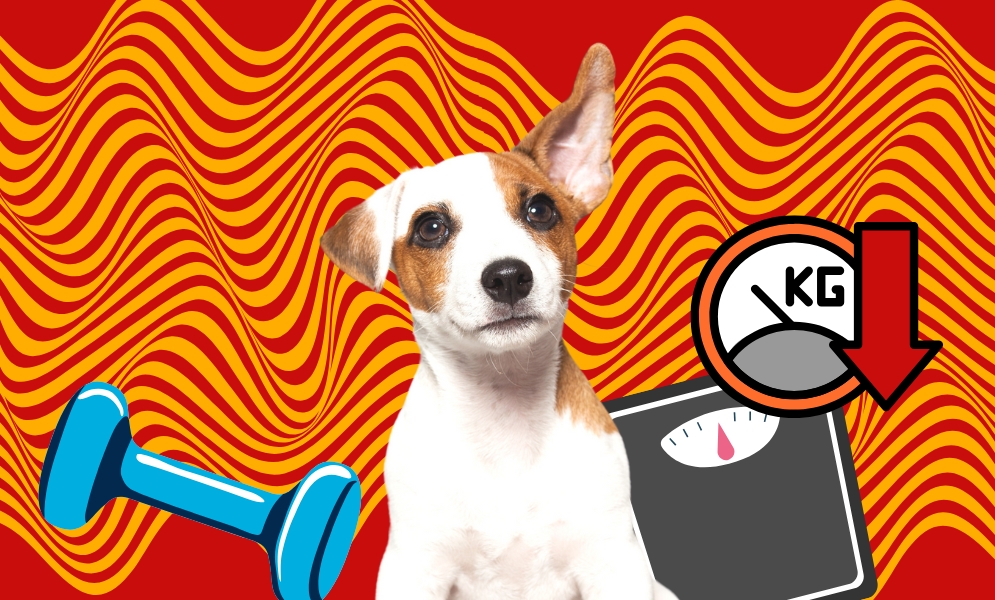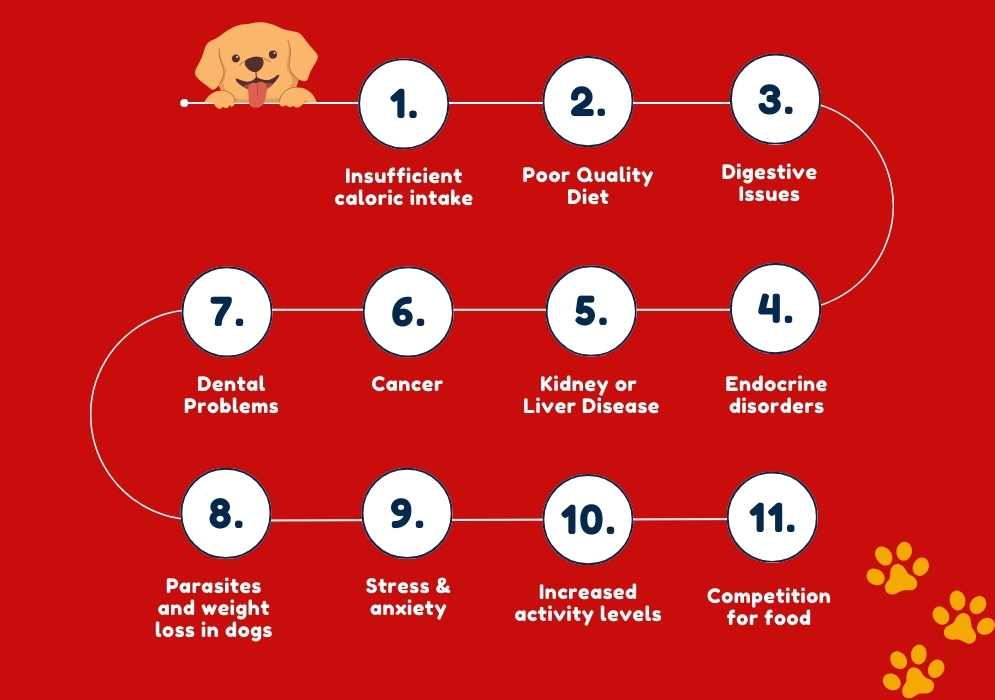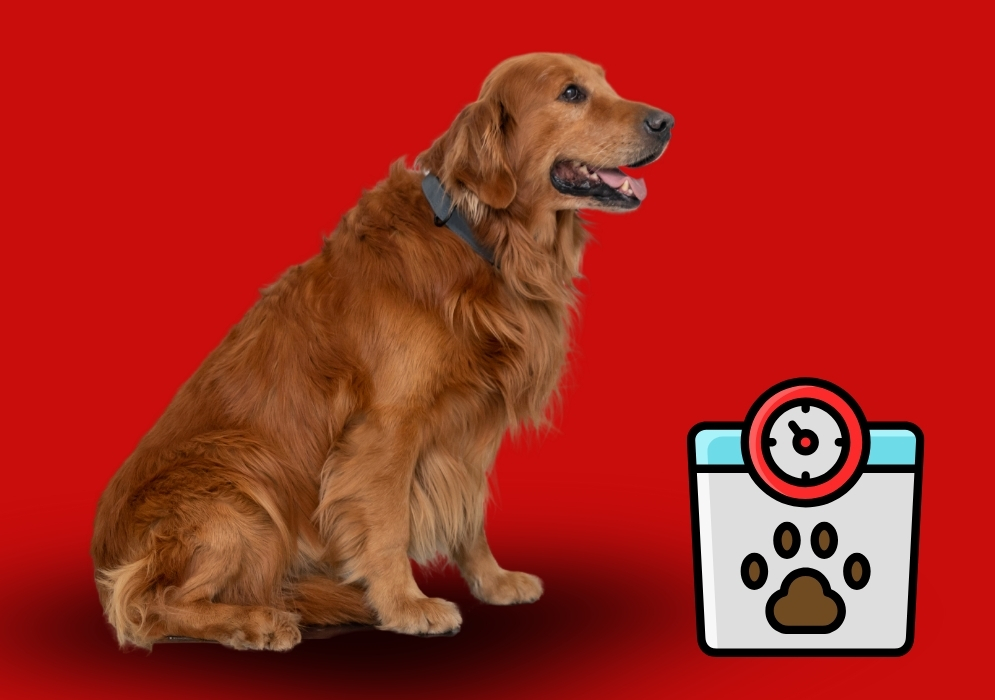Why is My Dog Losing Weight? Uncovering the Common Causes Behind Weight Loss in Dogs


As a pet parent myself, I know that witnessing your dog lose weight can be quite worrying and stressful. It is also natural to wonder about the underlying causes.
So, in this article, I will explore some of the common reasons behind dog weight loss and provide valuable insights to help you address this issue effectively.
Understanding the Normal Weight Range for Dogs
Before delving into the potential causes of weight loss, it’s essential to understand what constitutes a healthy weight range for your dog. A dog’s ideal weight can vary based on several factors, including breed, age, and body type.
But no matter what breed, you can easily determine if your dog is at a healthy weight by following a few simple checks:
Visual Inspection
Take a good look from the top-down angle. At this angle, your dog’s waist should be noticeable behind their ribs. If your dog looks more like a sausage, they might be overweight. Also, your dog should have a slight tuck-up behind the ribs when viewed from the side. If the abdomen is hanging down, it could indicate excess weight.
Feel the Ribs
Run your hands along your dog’s sides. You should be able to feel their ribs without pressing hard. If you can’t feel them, your dog might have a “fat cushion” covering them, indicating they are overweight.
Body Condition Score (BCS)
Vets often use a Body Condition Score (BCS) system, which rates dogs on a scale from 1 to 9. A score of 4-5 is considered ideal. You can use this system at home by visually inspecting and feeling your dog’s ribs, waistline, and tummy.
Keeping your dog at a healthy weight is crucial for their overall well-being and longevity. Regular exercise and a balanced diet are key to maintaining their ideal weight.
Common Causes of Weight Loss in Dogs

Weight loss in dogs can stem from various reasons, ranging from dietary imbalances to underlying medical conditions. Let’s explore some of the most common culprits:
Insufficient Caloric Intake
If your dog isn’t consuming enough calories to meet their energy requirements, weight loss can occur. This could be due to a lack of appetite, improper portion sizes, or an unbalanced diet.
Poor Quality Diet
Feeding your dog a low-quality or nutrient-deficient diet can lead to malnutrition and subsequent weight loss, even if the caloric intake seems adequate.
Digestive Issues
Conditions like inflammatory bowel disease, pancreatitis, or food intolerances can impair your dog’s ability to absorb and utilize nutrients from their diet, resulting in weight loss.
Endocrine Disorders
Conditions like diabetes, hypothyroidism, and Cushing’s disease can disrupt your dog’s metabolism and lead to weight fluctuations.
Kidney or Liver Disease
Impaired kidney or liver function can impair nutrient absorption and metabolism, causing weight loss.
Cancer
Certain types of cancer can cause weight loss due to increased energy demands, loss of appetite, or interference with nutrient absorption.
Dental Problems
Dental issues like tooth decay or gum disease can make it painful for your dog to eat, resulting in decreased food intake and subsequent weight loss.
Parasites and Weight Loss in Dogs
Internal parasites, such as worms or protozoan infections, can rob your dog of essential nutrients, leading to weight loss. Regular deworming and preventative measures are crucial to maintain your dog’s overall health and prevent parasite-related weight loss.
Stress and Anxiety
Stressful situations, changes in the environment, or separation anxiety can lead to decreased appetite and weight loss in dogs.
Increased Activity Levels
If your dog’s activity levels have increased significantly without adjusting their caloric intake, they may experience weight loss.
Competition for Food
In multi-pet households, competition for food or resource-guarding behavior can prevent some dogs from getting their fair share of nutrients, leading to weight loss.
When Should You Seek Veterinary Help for Weight Loss in Dogs?

If you notice significant or unexplained weight loss in your dog, it’s essential to seek veterinary attention promptly. Here are some signs that warrant a visit to the vet:
- Rapid or excessive weight loss
- Weight loss accompanied by other symptoms (e.g., vomiting, diarrhea, lethargy)
- Persistent lack of appetite or refusal to eat
- Weight loss despite maintaining the same diet and exercise routine
Your veterinarian can perform a thorough examination and run necessary tests to determine the underlying cause of your dog’s weight loss. Once they detect the underlying cause, they can suggest appropriate treatment to manage weight loss in dogs.
Dog Losing Weight: Treatment, Management and Prevention
The treatment and management approach for dog weight loss will depend on the underlying cause. Some common strategies include:
Dietary Adjustment
If the weight loss is due to nutritional deficiencies or imbalances, your veterinarian may recommend dietary changes, such as switching to a higher-quality or calorie-dense food or incorporating nutritional supplements.
Medication
In cases of medical conditions like endocrine disorders, kidney disease, or cancer, your veterinarian may prescribe medications to manage the underlying condition and support weight gain.
Parasite Treatment
If parasites are the culprit, your veterinarian will recommend appropriate deworming medications and preventative measures.
Increase Meal Frequency
Instead of feeding your dog once or twice a day, try giving smaller, more frequent meals throughout the day.
Add Healthy Supplements
Incorporate healthy fats like fish oil or coconut oil into your dog’s diet. You can also add cooked meats, eggs, or cottage cheese to their regular food.
Use Food Toppers
Enhance the appeal of your dog’s meals by adding tasty food toppers like wet dog food, bone broth, or a bit of peanut butter.
Environmental and Behavioral Modifications
Addressing the underlying environmental or behavioral triggers through training, enrichment activities, or separating feeding areas can help remedy weight loss related to stress, anxiety, or competition for food.
Weight loss in dogs can be a complex issue with various underlying causes. By understanding the common reasons behind weight loss, monitoring your dog’s weight and body condition, and seeking veterinary assistance, you can take proactive steps to address this issue and ensure your furry companion’s overall well-being.









Leave A Comment